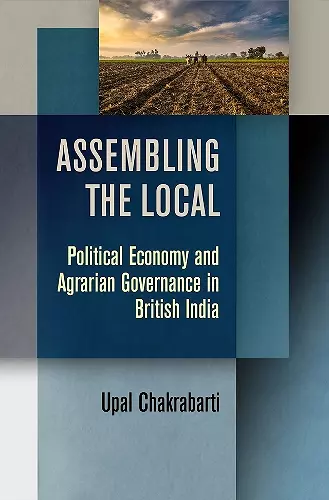Assembling the Local
Political Economy and Agrarian Governance in British India
Format:Hardback
Publisher:University of Pennsylvania Press
Published:22nd Jan '21
Currently unavailable, and unfortunately no date known when it will be back

In Assembling the Local, Upal Chakrabarti argues that the "local" should be reconceptualized as an abstract machine, which was itself central to the construction of the universal, namely, the establishment of political economy as a form of governance in nineteenth-century British India.
In 1817, in a region of the eastern coast of British India then known as Cuttack, a group of Paiks, the area's landed militia, began agitating against the East India Company's government, burning down government buildings and looting the treasury. While the attacks were initially understood as an attempt to return the territory's native ruler to power, investigations following the rebellion's suppression traced the cause back to the introduction of a model of revenue governance unsuited to local conditions. Elsewhere in British India, throughout the first half of the nineteenth century, interregional debates over revenue settlement models and property disputes in villages revealed an array of practices of governance that negotiated with the problem of their applicability to local conditions. And at the same time in Britain, the dominant Ricardian conception of political economy was being challenged by thinkers like Richard Jones and William Whewell, who sought to make political economy an inductive science, capable of analyzing the real world.
Through analyses of these three interrelated moments in British imperial history, Upal Chakrabarti's Assembling the Local engages with articulations of the "local" on multiple theoretical and empirical fronts, weaving them into a complex reflection on the problem of difference and a critical commentary on connections between political economy, agrarian property, and governance. Chakrabarti argues that the "local" should be reconceptualized as an abstract machine, central to the construction of the universal, namely, the establishment of political economy as a form of governance in nineteenth-century British India.
In Assembling the Local, Upal Chakrabarti brings a creative and rigorous Foucauldian eye to the key role of the discourse of political economy in practices of colonial governance. Demonstrating the intimacy between universalism and the limit-case of locality that demarcates its reach, his work is a challenging contribution to the intellectual history of political economy. * Andrew Sartori, New York University *
Assembling the Local offers a provocative new theoretical framework to understand the intellectual history of the British empire in India, especially in relation to the development of the science of political economy. Scholars have debated the extent to which metropolitan ideas shaped or were shaped by 'local' patterns of rule and social relations. Upal Chakrabarti thoroughly upends the dichotomy of the local versus the universal as he skillfully tracks the meaning and function of the idea of the 'local' both on the ground in early nineteenth-century Cuttack as well as in the inductive turn in the philosophy of science and political economy. * Karuna Mantena, Columbia University *
ISBN: 9780812252736
Dimensions: unknown
Weight: unknown
288 pages